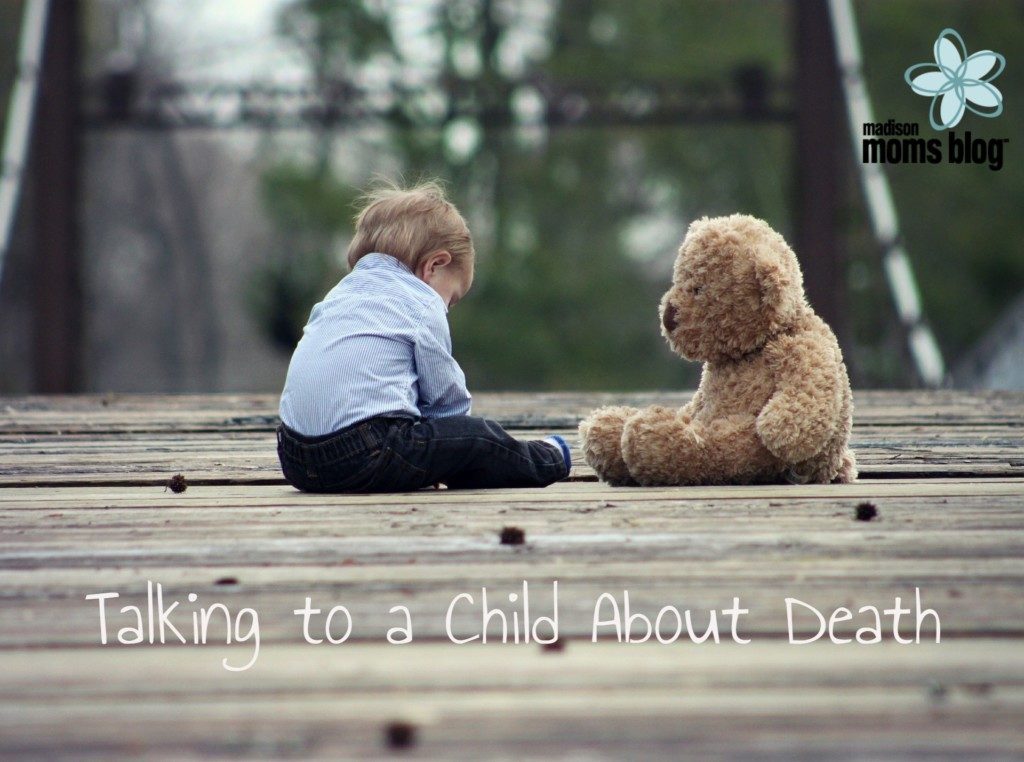 My son is 3 ½ years old and has already had three experiences with death.
My son is 3 ½ years old and has already had three experiences with death.
I have no idea how to talk about death and dying with a child. However, that doesn’t mean I shouldn’t try.
When my cousin passed away unexpectedly last spring, I got the call from my mom around 7:30 a.m. on a workday. I was the first person up in our house that morning and had just gotten out of the shower when she called. After we hung up, I went to share the news with my husband who was still in bed at the time. Which was the exact moment our son woke up and toddled into our room.
As I choked on the words “My cousin died”, I started to cry. I hadn’t really cried in front of our son, so he immediately took notice.
He climbed into our bed and said “Mama, what’s wrong?” All I could say was that I was sad because we had lost someone we loved.
How do you explain death to a toddler?
I realized that “lost” has a different meaning to a child. Children lose toys. Or they get lost in the store. Losing someone, to a kid, probably means that eventually they will be found.
So, I took a deep breath and instead tried to communicate in words he might understand.
“Remember in the movie Iron Giant when the deer falls down in the woods? And Hogarth tells the Giant not to touch it because the deer is dead?” I said.
He nodded.
“Well, my cousin died too. Like the deer. Which means we won’t ever see him again.” I continued.
My sweet, empathetic boy leaned in to hug me. And I cried some more.
“But why Mama?” he asked.
“Well, because he was sick. And sometimes when people get really sick, they don’t get better.” Again, I tried to choose my words carefully…Because I didn’t want him to think he was going to die the next time he caught a cold.
“Oh.” Was all he said in reply.
I knew he probably did not understand. However, it was the best I could do in the moment.
When the time came to honor and celebrate my cousin’s life, the service took place in his aunt’s backyard. On a beautiful Saturday afternoon over Memorial Day weekend. There was food, drinks, and family. And while there were plenty of tears, my son wound up playing in their neighbors backyard during the service.
I’m pretty sure he thought we were at a party.
Then, six months later, my college mentor passed. Unfortunately, just three weeks shy of an event planned in her honor. I hadn’t seen her in several years and knew her health had been declining. However, I was excited to attend the reception recognizing her years of service and incredible impact she had on the institution, where I now work. I was excited to show her pictures of my son. And update her on my new position at the University.
Sadly, I never got the chance.
The University opted to hold the event in her honor anyway. Knowing that many people were planning to be in town for that, her family held her memorial service earlier that same day.
After attending both events, I was riding a roller coaster of emotions. I had spent the whole day trying not to cry. So, when I got home after that long, emotional day, I went straight to my room and broke down.
I heard my son ask my husband “What’s wrong with Mama?” Shortly after that, I heard the pitter-patter of his little feet coming down the hall.
“Are you okay Mom?” he asked as he entered the room.
I looked up with teary eyes and told him “I’m okay Honey. Right now Mama is just sad.”
He asked me why I was sad. I told him “Someone I love died. And I’m sad because I’m never going to see her again.”
He did not ask questions this time. He simply seemed to understand.
He hugged me and asked again if I was okay. I told him I just needed a minute, but after that, I would be fine.
Later that week, as we drove home from school, he suddenly asked me who my daddy was. As you may have read in a previous post, my dad passed away when I was not quite 2 ½. I told him my Daddy was the man in the picture on his bookshelf. The one who watches over him while he sleeps.
“But where is your Dad?” he probed.
“Well honey…my Dad died when I was little,” I told him.
“He DIED?” he asked incredulously.
“Yes, he died”. I repeated.
“But I’m not dead.” He said.
“No. You are not dead. And I’m very glad about that. If you were dead, I’d be very, very sad,” I said.
“YOU’RE not dead,” he replied.
“No, I’m not dead either” I confirmed.
Maybe he doesn’t get it…I thought.
How can I help him understand death?
Sadly, a third opportunity came along earlier this month, when my husband’s grandmother passed away. This time my son knew who it was. He had been to visit her several times.
When we got the call telling us she was gone, I told him we were going to go to Grandma and Grandpa’s for the weekend. But that this time we were going for a funeral. To say good-bye to Great-Grandma.
I had no idea how he would do at the funeral, with no playground next door to distract him. However, I also felt it was important for all of us to be there.
Thankfully, he was on his very best behavior at the church. A place he was already familiar with since we had our family Christmases there the past few years.
He made his rounds to say hello to everyone during the visitation, which was an hour and a half long. He sat quietly and calmly in the pew, and made it through the hour-long service with no meltdowns as well.
At the end of the service, the Pastor invited everyone to say their final goodbyes to the deceased.
When I asked my son if he wanted to say good-bye to Great Grandma, he jumped off the pew and enthusiastically said “Yeah!” He walked to the front row, peeked around his Great-Aunt, and looked back at us confused.
“But I don’t see her,” he said.
It broke my heart.
I choked up as I picked him up to carry him as we all walked out of the church together.
Once we were back in the church hall, he looked around and asked “Mama, why is everybody crying?”
I told him everyone was sad because Great-Grandma was gone and we were never going to see her again.
That is when it happened.
My little boy broke down and cried.
I hugged him tight, as I knew in that moment that he finally understood what was happening. I rubbed his back and tried to soothe him as he processed why we were all there.
When he looked up at me with sad, teary eyes, he said, “Mama, I’m sad”.
I asked him, “Why are you sad?”
His reply? “Because Great-Grandma is gone.”
As with most funerals, a luncheon followed the service. My sweet boy remained sad through lunch. Which made me second guess bringing him and exposing him to death and dying.
Nevertheless, I also understand that death is a part of life. I was exposed to it at a very young age as well. And while sad, I learned early on that life can be hard. And unfair. That is just the harsh reality of it.
However, I know that in the midst of sadness and pain, life can also be so incredibly beautiful.
In the words of Alfred Lord Tenneyson, “’Tis better to have loved and lost than never to have loved at all.” How fortunate that my son had an opportunity to meet his Great-Grandma, and my cousin, before they passed.
As much as I would like to shield him from pain, I know that there will be heavy days. There will be tears. There will be hurt feelings. And yes, sometimes even death and loss.
Is this the right way to talk about death with a young child? I honestly have no idea. However, I know my job is to help him learn, to understand and navigate life. Even, and maybe especially, the difficult parts.
My job is also to provide comfort during tough times. To let him know that it is okay to feel sad. And it’s okay to cry. And, most importantly, to be there whenever he needs me to wipe his tears away when he is ready to move on.














Thank you. We’re navigating these waters currently – my dad passed a year ago right before my son turned three and my husband’s grandmother died last week. It’s so hard to know what to tell small children and how, especially when you are deep in the throes of grief yourself, but being honest with simple answers has worked well for us. Though for a while after my Dad died, if I so much as sniffled, my son would come running “are you sad about Grandpa?” I am so lucky to have such an intuitive and compassionate child who always seems to know just when I could use a hug or a laugh.
I’m so sorry for your losses Danielle. It can be hard enough to process grief yourself. Then we have the added challenge of figuring out how to explain it to our kids. We have always tried to be honest and upfront with our son. I personally think that’s the best strategy. Because otherwise they might hear or learn about it from someone else or in some other way without us there to help them process and try to understand it.
We are all just doing the very best we can with what we have and know in the moment. How wonderful that your son has already learned empathy and compassion! Those can be hard things to teach a child too.
Hang in there!
I am so sorry for all of the losses your family has faced. That’s a lot in such a short period of time. From all that I’ve read, you handled it exactly right. Honest, straightforward and in language kids can understand. Being open with your feelings and allowing him to feel his as well. It’s really hard, especially when you’re navigating your own grief, but it sounds like you handled it all exceptionally well!
Thank you Kim for the kind words! I honestly had no idea if I was doing the right thing or not, but I do feel like honesty is the best policy and that he can handle hard things with love and support.
There are so many new challenges to navigate in motherhood and I’m learning as I go. I appreciate the vote of confidence in how I handled these and also appreciate the sympathy. It was a lot for one year!